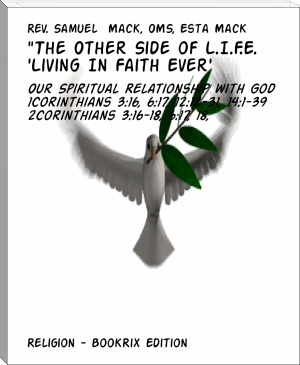THE SUPERNATURAL HABITS - PAUL & NUALA O'HIGGINS (the best e book reader .txt) 📗

- Author: PAUL & NUALA O'HIGGINS
Book online «THE SUPERNATURAL HABITS - PAUL & NUALA O'HIGGINS (the best e book reader .txt) 📗». Author PAUL & NUALA O'HIGGINS
Since forgiveness means we forgive the person of any real or imagined offense, we therefore extend forgiveness into those three great areas of relationships. We forgive:
• ourselves, for past failures and missed opportunities
• others, for all real and imagined offenses
• and God, for imagined offenses and for disappointments that we may have attributed to Him.
How Often to Forgive?
“Then Peter came up and said to him, ‘Lord, how often shall my brother sin against me, and I forgive him? As many as seven times?’ Jesus answered ‘Not seventy times but seventy times seven times”’ (Matthew 18:21-22) Forgiveness is not something we occasionally do – a valve we sometimes turn on. It is a continuous flow towards everyone and every situation we meet. It is a lifestyle of mercy from ones who have received mercy. It is a habit of the most supernaturally empowered believers that keeps them connected with the love and joy of the Lord.
Judge Not
Jesus said “Judge not, and you will not be judged; condemn not, and you will not be condemned; forgive, and you will be forgiven.” (Luke 6:37)
“For what is it to me to also judge those who are outside? Do you not judge those who are inside? But God judges those who are outside. Therefore put out from you the evil one.” (1 Cor. 5:12-13)
At first sight these scriptures seem contradictory. Though we are warned not to judge, we also have the responsibility to discern and to take protective action in many situations to maintain good order. This kind of judgment and discernment is necessary.
What the Lord forbids is to “write someone off”, despise them or esteem them as less than valuable because of their behavior or views. The only inhabitants of God’s kingdom are pardoned sinners, and some of the greatest saints are those who have had the worst past. We may judge behavior but we may never judge people. This kind of judging is strictly limited to situations over which we have personal jurisdiction.
There is an apparent contradiction in the scriptures between the words of Jesus “Judge not that you may not be judged” (Matthew 7:1) and the words of Paul in 1 Corinthians 5. In fact there is no contradiction. The judgment Paul speaks of is not judging for condemnation but for correction, training and maintaining good order.
The exercise of forgiveness should never be taken as an excuse for not keeping good order. Leaders and rulers at every level have a responsibility to deal with wrong and illegal behavior. Such behavior has to be corrected for good order within society – in the home, in the congregations, and in public life. This is why we have a police and a court system. Imagine the chaos if we all ignored the traffic laws or if these laws were never enforced. So this kind of judging is absolutely necessary and the scriptures frequently sanction this good order. What they forbid is unforgiveness, bitterness and vengeance because of their toxic effect on us and on others.
‘One of the primary characteristics of western society is an inability to enforce standards ... Laws do not mean much unless they are enforced. The saddest and most alarming trend is in the western churches … society has so influenced us that Yeshua’s exhortation (judge not that you be not judged) has been taken to mean that we are not to enforce standards of righteousness in the Body of Believers.
The indulgent orientation of modern western Christianity also contradicts Paul‘s teaching in 1 Corinthians 5 and 6. Here we read that the community of faith is to discontinue fellowship with the sexually immoral members. Then we read that the community is to have a judiciary to settle serious disputes between members ... In many of today’s churches … mercy and grace are perverted to allow license.” (Excerpted from Dan Juster “Israel’s Restoration” Jan 2008)
Forgiveness & Accusation
Behind all unforgiveness is the spirit of the accuser - the devil. Accusation is his greatest strategy against believers. Accusation consists of thoughts bombarded into our consciousness from the realm of the spirit by evil spirits. These thoughts are designed to make us doubt:
• our salvation
• God’s love for us
and to
• hate ourselves, and
• hate others
Accusation is often directed at our own self-worth and provokes us to despise and hate others and ourselves. This can generate depression, despair, discouragement, self-loathing and even suicide. When accusation is directed towards others it produces envy, jealousy, bitterness and hatred.
Behind accusation are evil spirits whose master plan is to falsely accuse us. Therefore accusing thoughts have to be dealt with, not just with positive psychology but by taking authority over lying thoughts and spirits. Since believers base their faith on the blood of Jesus and His atoning sacrifice, we know we are acceptable to God, not on the basis of our own performance, but on the basis of the perfect sacrifice of Jesus. We can, therefore, answer all accusations of the devil by pointing to the testimony of the blood of Jesus.
We can cancel all agreement with the accuser and come into agreement with the testimony of the Blood of Jesus. The testimony of the accuser is always: “You are guilty”, “You are not good enough” The testimony of the blood of Jesus is, on the other hand, “You are forgiven”, “Your sins are paid for”, “You are acceptable in the Beloved.”
In the light of this fact,
• we can refuse to agree with the negative thoughts of the accuser, and
• we can command the lying spirits behind those negative thoughts towards God, ourselves and others to flee in Jesus’ name.
As we continue in this supernatural habit of forgiveness, the Holy Spirit will show us more areas where we can apply forgiveness to ourselves and others so that we can be released from every trace of guilt and bitterness. Many accusing thoughts are trapped in our consciousness for years, but once we recognize these thoughts are not in harmony with God and do not have their origin in Him, we can reject them from our consciousness and command the illegal spirits that have planted these thoughts to leave us.
Revelation 12:10 says that God’s kingdom comes as the accuser is thrown down. “And I heard a loud voice in heaven, saying, ‘Now the salvation and the power and the kingdom of our God and the authority of his Christ have come, for the accuser of our brethren has been thrown down, who accuses them day and night before our God. And they have conquered him by the blood of the Lamb and by the word of their testimony, for they loved not their lives even unto death.’” (Revelation 12:10-11) The accuser has lost his legal right to accuse. When we forgive we continue in the realm of God’s kingdom of love and mercy but when we fail to forgive others we restore in part the realm of the accuser. The most supernaturally empowered believers know how to silence the voice of the accuser “by the blood of the lamb and the word of our testimony.” (Revelation 12:11)
Forgiveness of self and others keeps the accuser dethroned and the wonderful realm of God’s love, mercy and joy in the ascendancy every day.
This is the way of the supernaturally empowered believer.
Chapter 6: THE HABIT OF SPEAKING LIFE
CHAPTER VI
THE HABIT OF SPEAKING LIFE
Examine the following statements:
I love you.
You’re beautiful.
Well done.
You’re a blessing.
Thank You. That’s great!
I enjoyed that.
Keep on … you’ll make it.
We’re proud of you.
I’m blessed with great health.
I hate you.
You’re ugly.
You never do anything right
It’s all your fault.
That could have been better.
Why didn’t you …?
You’ll never be good at that.
You’re a disappointment to us.
At my age what can you expect?
Each of these statements does not simply carry information but conveys emotion. The emotion conveyed in these simple statements can either build someone up or destroy them. Our minds are like a river where streams of words and thoughts flow continually. The words we agree with and store up in our souls will determine our destiny. Our spoken words establish agreement or disagreement with our thoughts and seal them into our consciousness and lives. It is, therefore, vital to our well-being and destiny that we learn to use our tongues effectively, and to carefully choose what thoughts we establish and reinforce with our tongues.
Therefore one of the most essential elements of supernatural living is the use of the tongue. The most effective productive and joyful believers learn to use their tongues in positive, merciful and kindly ways. We are promised that if we do this we will see good days and long life. “For he that wants to love life and to see good days, let him restrain his tongue from evil, and his lips from speaking guile.” (1 Peter 3:10)
Traditional Christianity and Judaism have paid insufficient attention to this vital part of life. Our words have a much more important part to play in the effectiveness, success and quality of our lives than most people realize.
Words & Dominion
When God first made man (male and female) He gave them dominion over all the creatures on the earth. They exercised their dominion primarily by their use of words. “And God said, ‘Let us make man in our image, after our likeness. And let them have dominion over the fish of the sea, and over the fowl of the heavens, and over the cattle, and over all the earth, and over all the creepers creeping on the earth.’” (Genesis 1:26) Adam exercised this dominion by using his tongue to name the animals.
We exercise dominion over our lives through the use of the tongue along with our prayers, faith, thoughts and actions. Throughout His teachings Jesus emphasized the redeemed use of the tongue, and He modeled it in His actions.
“A good man out of the good treasure of the heart brings out good things; and an evil man out of the evil treasure brings out evil things. But I say to you that every idle word, whatever men may speak, they shall give account of it in the day of judgement. For by your words you shall be justified, and by your words you shall be condemned.” (Matt. 12:35-37) Here Jesus says that our tongues will actually decide our present and eternal destiny.
How can this be? Most Christians believe that faith and behavior determine our destiny. This is true, but our tongues have an equally important part in determining our destiny as with them we engage our wills and give our consent.
Embracing our Eternal Destiny with Words
God has provided atonement for every human being through the death of Jesus on the Cross. Our part is to receive this reconciliation by faith and repentance and





Comments (0)